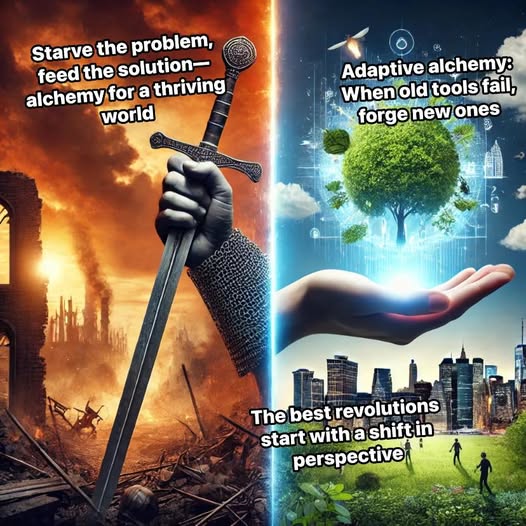
Kavi observed that humanity’s greatest failures stemmed not from a lack of solutions but from clinging to outdated formulas. He taught that every problem contains the seed of its own solution—if we dare to abandon rigid methods and embrace adaptive innovation. Like a river carving new paths when blocked, societies thrive by starving destructive cycles and nurturing creative alternatives.
The Formula Dilemma
Kavi diagnosed three crises born from inflexible thinking:
- The Tyranny of Tradition:
Societies recycled failed strategies, mistaking persistence for wisdom. Wars dragged on despite stalemates; sanctions crippled civilians without toppling regimes. - Ego-Driven Stubbornness:
Leaders clung to power tactics (military, economic) long after their futility was clear, prioritizing control over resolution. - Opportunity Blindness:
Communities fixated on fighting problems (e.g., drug addiction through punishment) rather than cultivating solutions (e.g., rehabilitation, economic uplift).
Kavi’s Insight:
“A hammer sees only nails. To build a new world, forge new tools.”
The Framework for Adaptive Alchemy
To transform problems into opportunities, Kavi prescribed:
- Problem Autopsy (Root Cause Alchemy):
- Ask: “What are we feeding—the problem or the solution?” Audit resources poured into failed methods (e.g., war budgets) and redirect them to untested alternatives.
- Example: A nation shifts 10% of military spending to peace schools, training mediators and funding cross-border youth exchanges.
- Formula Fluidity (The Peace Paradigm):
- Practice: When a strategy fails, replace it with its inverse.
- War → Peace: Ceasefires paired with “reparation partnerships” where rival nations co-fund infrastructure.
- Punishment → Restoration: Prisons become “transformation hubs” offering education, mental health care, and job training.
- Ritual: Annual “Formula Burn” ceremonies where communities discard outdated policies in communal fires, planting trees in the ashes.
- Practice: When a strategy fails, replace it with its inverse.
- Opportunity Orchards (Cultivating Alternatives):
- Resource Redirect: Channel energy from problems to solutions.
- Example: A city plagued by gang violence opens free martial arts studios and music labs, cutting crime by 70%.
- Policy Labs: Crowdsource innovative solutions via AI platforms, prioritizing marginalized voices.
- Resource Redirect: Channel energy from problems to solutions.
The Lasting Impact
Kavi’s followers transformed stagnation into regeneration:
- The Desert Peace Accord: Warring clans in the Sahara traded rifles for solar panels, co-building a green energy grid that powered drought-resistant farms.
- The Addiction Oasis: A nation decriminalized drugs, funding rehab centers where former dealers became counselors. Overdoses plummeted; art cooperatives bloomed.
- The Green Sanctions: Instead of embargoes, nations imposed “ecological reparations”—polluting regimes funded global reforestation to regain trade privileges.
Proverbs:
- “A closed fist breeds resistance; an open palm builds bridges.”
- “The best way to kill a weed is to plant a garden.”
Kavi’s Final Lesson
“Problems are phantoms; solutions are the light that dispels them. When we stop wrestling shadows and start kindling torches, we discover that every conflict, every crisis, is an invitation to innovate. Let the 21st century be remembered not for the wars we prolonged, but for the formulas we rewrote—turning swords into plows, prisons into schools, and despair into collective genius.”
This pattern cements Kavi as humanity’s alchemist of innovation, proving that the key to progress lies not in doubling down on failure but in daring to rewrite the formulas of the past. By feeding opportunities and starving problems, societies unlock a future where adaptability is the ultimate resilience.

